 loading
loading
Arts & CultureYou can quote themOn Murphy and socialism Yale law librarian Fred R. Shapiro is editor of the <i>Yale Book of Quotations</i>.
 Photo illustration: John Paul ChirdonView full imageMore on "Murphy's Law" In my July/August 2007 column, I examined the origins of "Murphy's Law" -- "Anything that can go wrong, will" -- and concluded that its roots probably lay not in the 1949 rocket sled tests at Edwards Air Force Base (the standard claim) but rather in the realm of show business. Crucial to the argument were Murphy's-like statements in magicians' magazines going back to 1928, discovered by Bill Mullins. Now, following up on a lead found by me, Mullins has pushed the magic version of Murphy's Law back to 1908. In June of that year the British conjuror Nevil Maskelyne wrote in The Magic Circular: "It is an experience common to all men to find that, on any special occasion, such as the production of a magical effect for the first time in public, everything that can go wrong will go wrong. Whether we must attribute this to the malignity of matter or to the total depravity of inanimate things, whether the exciting cause is hurry, worry, or what not, the fact remains." An even earlier specialized version of the law has been unearthed by Stephen Goranson. The 1877-78 minutes of the Institution of Civil Engineers, published in London, contain this statement by Alfred Holt: "It is found that anything that can go wrong at sea generally does go wrong sooner or later." Even if we conclude, as I believe, that Murphy's Law is an old proverb in many fields, there remains the question, why Murphy? At what point did the ancient adage become attached to a particular Irish name, and did Edward A. Murphy Jr. at Edwards AFB inspire that development? By searching Google Books, I have found a new datum in the quest. Anne Roe, in her 1953 book The Making of a Scientist, referred to "the physicist who introduced me to one of my favorite 'laws,' which he described as 'Murphy's law or the fourth law of thermodynamics' . . . which states: 'If anything can go wrong it will.'" Roe's use of the term "Murphy's Law," two years earlier than any previously found, was apparently collected from the anonymous physicist in 1948-50.
Kind hearts and socialists
Lewis Girdler ’61 writes in: "Is there any known attribution for the line to the effect that if you're not a socialist at 20, you have no heart, but if you're still a socialist at 30, you have no brain?" One of the pleasures of compiling the Yale Book of Quotations was tracing and cross-referencing different versions and precursors of famous quotes. This one is usually credited to Georges Clemenceau, but W. Gurney Benham's Book of Quotations cites French premier and historian Francois Guizot (1787-1874), translating his statement as "Not to be a republican at 20 is proof of want of heart; to be one at 30 is proof of want of head." Benham asserts that "Clemenceau adopted this saying, substituting 'socialiste' for 'republicain. '" But I was delighted to find that John Adams had expressed a similar idea well before Guizot entered adulthood. Thomas Jefferson preserved this quip, writing in a 1799 journal that Adams had said: "A boy of 15 who is not a democrat is good for nothing, and he is no better who is a democrat at 20."
The comment period has expired.
|
|